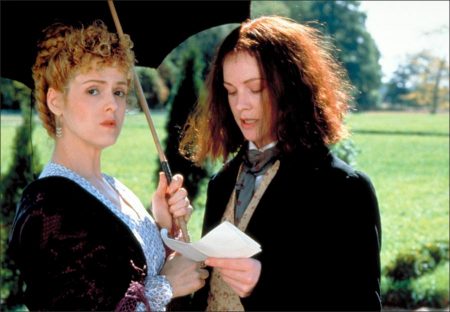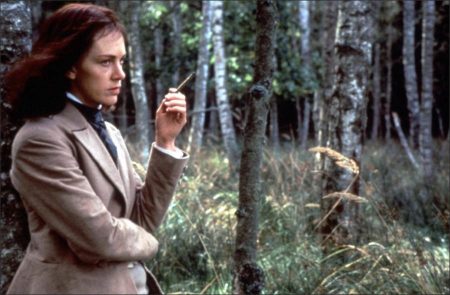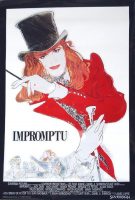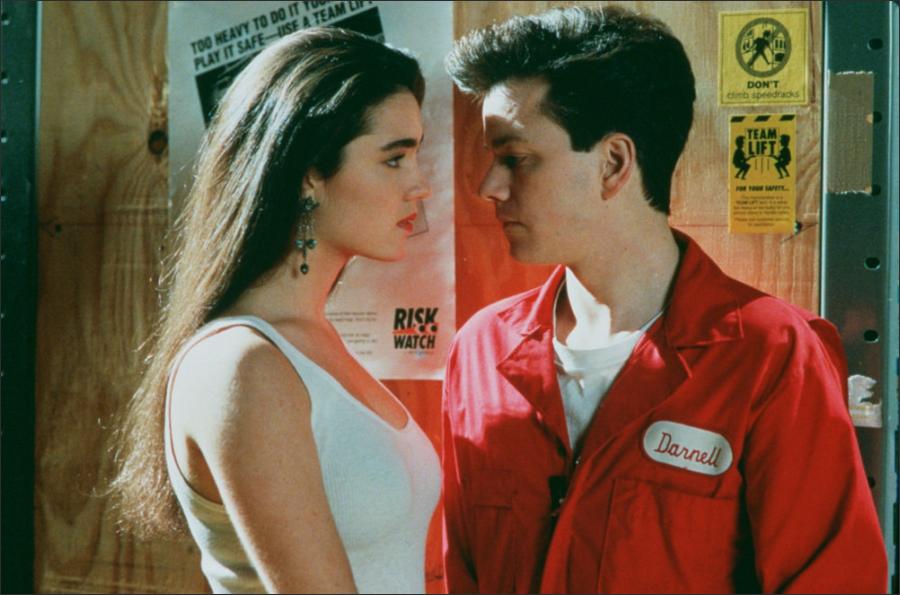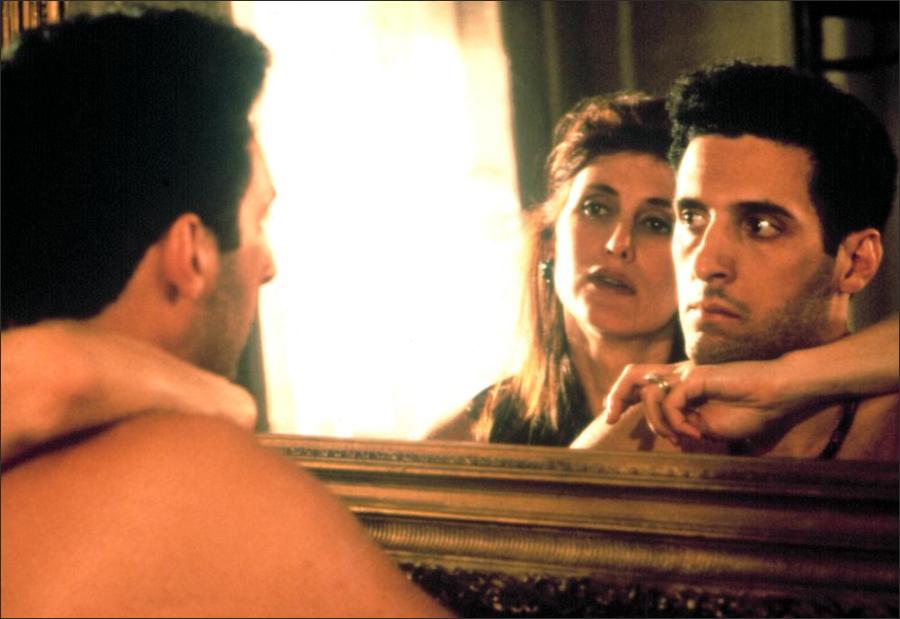Impromptu movie storyline. 1830s Paris. Novelist George Sand, who is known to be writing her memoirs, is causing a sensation in the literary scene not only for the quality of her writing, but because of her extreme views and manners, including blurring the lines between the sexes – she generally wearing men’s clothes – and her non-belief in the sanctity of marriage after having gone through the institution once before, now preferring sexual liaisons outside of her own wedlock, with the marital status of her lovers of no concern to her.
She is just coming to the end of a turbulent affair with Félicien Mallefille, who she is now trying to avoid in his continual pursuit of her. Despite thinking it will be a bore because of their insufferable hostess, she invites herself to a weekend gathering of some of France’s greatest artistic and creative minds – many who are attending solely for a weekend of free food – at the country estate of the Duke and Duchess D’Antan in Angers.
Impromptu is a 1991 British-American period drama film directed by James Lapine, written by Sarah Kernochan, produced by Daniel A. Sherkow and Stuart Oken, and starring Hugh Grant as Frédéric Chopin and Judy Davis as George Sand. The film was shot entirely on location in France as a British production by an American company. The main location used was at the Chateau des Briottières outside of Angers, in the Loire Valley.
Film Review for Impromptu
George Sand, whose real name was Amandine Aurore Lucie Dupin, became famous for taking a man’s name, wearing trousers, and smoking cigars in public. That would hardly get her into the papers today, but during her lifetime (1804-1876) she was one of the most famous women in the world, and her simple refusal to “act like a woman” helped set the stage for the women’s revolution that is still underway.
Sand did not simply smoke cigars and walk around with her hands in her pockets, however. She also generated enormous scandal by marrying a baron, then when she was 27 leaving him and their two children, and moving to Paris – where she wrote novels, moved in cafe society, and had notorious affairs with the writer Alfred de Musset and the composer Fredric Chopin.
Sand’s affairs inevitably inspired many duels, which have been seized upon by the makers of “Impromptu” as a way to lead into, and out of, the various chapters of her life. They also illustrate that Sand was more competent than some of the men who adored her. Her early lover Mallefille is always calling men out to defend their honor, and in his duel with Chopin (whose second is Eugene Delacroix), the strain grows so intense that Chopin faints, and it is up to Sand to grab the pistol and shoot Mallefille. (True to her lover, she insists the doctor treat Chopin’s faint before Mallefille’s bullet wound.) “Impromptu,” a disorganized, confusing but amusing biopic, stars Judy Davis as George Sand, and although I have admired Davis more in other films (such as “High Tide” and “My Brilliant Career”), that would possibly be because I had greater affection for the characters she played. A little George Sand goes a long way.
The movie belongs to the same genre as “Gothic” and “Haunted Summer,” which were both movies about that extraordinary house party at which Percy Bysshe Shelley, John Keats, Mary Wollstonecraft Shelley and others played musical beds while Mary wrote Frankenstein. The film has little serious interest in George Sand, and almost none in the novels that are all that remain of her, but diverts itself with scandal, atmosphere, location, and witty repartee (Mallefille: “You promised to love me!” Sand: “I didn’t promise to succeed!”) There are also episodes of dubious historical accuracy, as when a horse defecates on Sand’s writings.
Like a novel by E.L. Doctorow or Tom Wolfe, historical personages are brought onstage to act as fictional characters, and we get not only Sand, Chopin, Delacroix and de Musset, but even Franz Liszt, who calls Chopin “the Polish corpse” and tries to save him from Sand for the good of his health. The point of all of this is fairly obscure. When the good people of Paris are shocked by a woman wearing trousers, we are amused by their backwardness, but the movie leaves it at that, and doesn’t try to draw parallels, if any exist, between that time and ours. Nor does the behavior of the characters teach any lessons, except that genitals can be unruly in all centuries.
The pleasure of the movie comes at the same level as idle gossip; people scandalize each other to relieve the tedium, and then talk about it with great delight, while sometimes pretending to be shocked and sometimes pretending not to be shocked. I do not dismiss this pleasure, however; gossip is one of the few human activities that is free, inexhaustible, and entertaining. As for George Sand, you can read her books, I suppose, if you’re interested in more than the cigars. I mean to myself someday.
Impromptu (1991)
Directed by: James Lapine
Starring: Judy Davis, Hugh Grant, Mandy Patinkin, Bernadette Peters, Julian Sands, Ralph Brown, Georges Corraface, Anton Rodgers, Emma Thompson
Screenplay by: Sarah Kernochan
Cinematography by: Bruno de Keyzer
Film Editing by: Michael Ellis
Costume Design by: Jenny Beavan
Art Direction by: Gérard Daoudal, Anne Seibel
Music by: Frédéric Chopin, Franz Liszt, Ludwig van Beethoven
Distributed by: Sovereign Pictures
Release Date: April 12, 1991
Views: 212
